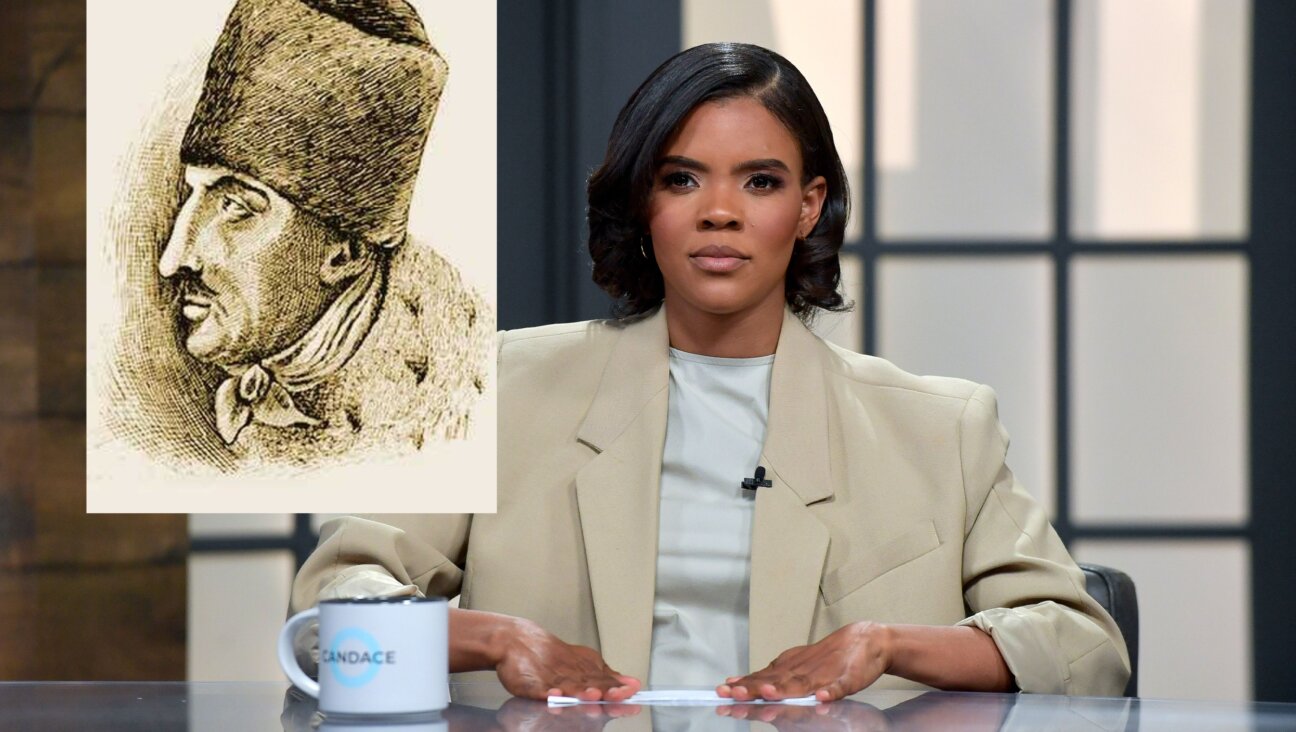Darren Aronofsky’s ‘Noah’ Departs From the Bible, But Doesn’t Go Far Enough

This Is the darkness, This Is the Flood: Russell Crowe plays Noah in Darren Aronofsky?s biblical epic. Image by Paramount Pictures/Niko Tavernise
For occultists, UFO conspiracy theorists, Atlantis enthusiasts, and eccentric spiritual types of all kinds, the story of Noah provides some tantalizing material.
According to the book of Genesis, Noah’s great-grandfather Enoch lived to be 365 years old before he “walked with God: and he was not; for God took him.” “Nephilim” roamed the land while the “Sons of the Elohim” took human women as wives, siring “mighty men which were of old, men of renown.” Noah himself, a lone righteous man in a corrupt society, heard the voice of God and saved himself, his family, and two of each animal from the flood brought on by the evils of humanity.
In a few chapters, the Bible describes a strange primordial world in which people live to be hundreds of years old, extraterrestrial beings invade Earth, and a wrathful God speaks to the devout while obliterating the rest of humankind.
There’s enough here not just for a lifetime of self-published books explaining the true origins of humanity — were the Nephilim, in fact, “ancient aliens”? — but also for a great Hollywood movie. What better fits the blockbuster aesthetic than ancient landscapes mixed with sci-fi speculation, sword-and-sandals action with Lovecraftian horror? Despite the disappointments of similar projects — the “Stargate” flicks, say, or Ridley Scott’s “Prometheus” — it’s a movie I’d like to see.
Unfortunately, Darren Aronofsky’s “Noah,” starring Russell Crowe in the title role, is not that movie.
Aronofsky would seem well suited to plumb the depths of biblical weirdness. In his first feature, the black and white “Pi” (1998), he showed a young mathematician going crazy in his Chinatown walkup while trying to figure out the numerical pattern underlying all of creation. In “The Fountain” (2006), he blended a voyage to the mythical Mesoamerican underworld of Xibalba with the story of a cancer researcher trying to save his dying wife. Aronofsky’s previous movie, “Black Swan” (2010), portrayed the terrifying conflation of art and reality in the mind of a ballerina dancing the lead in “Swan Lake.”
In “Noah” too there are traces of this obsession with madness and mysticism. Here, after all, is a character who envisions the destruction of the world by water — and Crowe does a fine job as the tormented, increasingly fanatical messenger of “The Creator.” (The movie does not, notably, use the word “God.”) But “Noah” is not a psychological character-study in the manner of “Black Swan,” nor does it weave together otherworldly myth with this-worldly struggle, as in “The Fountain.”
Rather, “Noah” tries to be a lot of other things. It’s an inquiry into the nature of good and evil, and the difficulty of maintaining a moral footing in troubled times. It’s an action movie starring fallen angels, who conveniently take rock monster form. It’s a warning about resource depletion and climate change — and the suffering that environmental disaster can cause. At its most explicit, the movie takes a crack at the old question of what it truly means to be human. In trying to do all of these things, however, it winds up doing none of them well.
At the beginning of the movie we are told that the descendants of Cain — the man who killed his brother Abel before going to live “in the land of Nod, on the East of Eden” — built an advanced industrial society, dependent on a glowing mineral called tzohar. Once the tzohar was depleted, society collapsed. Though humans had been helped once by a group of fallen angels called the Watchers, they had since turned against their protectors, provoking the Watchers’ enmity in turn.
None of this, of course, exists in the Bible, and the freewheeling embroidery has earned the suspicion of Christian groups as well as a disclaimer from Paramount, stating that the movie was only “inspired by” the biblical story.
In fact, Aronofsky and his fellow screenwriter, Ari Handel, aren’t as far afield as some might think. Though Jewish sources tend to downplay the mystical implications of the text, with most medieval commentators following the Midrash in explaining that the “Sons of the Elohim” were powerful people, not angels, other documents provide a more colorful picture. The Watchers, in particular, can be traced to 1 Enoch, an apocryphal text dating to about the 2nd century B.C.E., whose only complete copy survives in the Ethiopian language of Ge’ez.
“Noah” doesn’t follow that book exactly either — in Enoch the fallen angels are far more malicious than the movie’s stone-encrusted Watchers, and Enoch describes Noah himself as a kind of magical albino, not the gray bearded patriarch embodied by Crowe. But the problem with “Noah” isn’t its departure from scriptural sources — it’s that it doesn’t go far enough.
Indeed, for anyone looking to adapt the skeletal narrative of Bible, or even the hallucinatory story of Enoch, the first order of business might be to imagine what a degenerate human society would look like, 10 generations after creation. In “Many Waters,” for example, a Christian-inflected telling of the story by Madeleine L’Engle, Noah and his family are good-hearted desert-dwellers whose oasis community slips into anarchy when its less upstanding members undermine the social contract through theft and violence.
Aronofsky, in contrast, never tries to show what normal human life might have been like in antediluvian times. Rather than struggle against a corrupt society, Noah lives in isolation with his wife, Naameh (Jennifer Connelly), his sons Shem, Ham and Jafeth (Douglas Booth, Logan Lerman and Leo McHugh Carroll), and a girl named Ila (Emma Watson) whom he rescued and adopted when she was a child. Occasionally they pay a visit to Noah’s grandfather, Methuselah (Anthony Hopkins), who lives in the middle of a mountain like one of Tolkien’s dwarves.
As for other people, the pre-apocalyptic world before the flood looks a lot like the post-apocalyptic world in other movies: Society has collapsed, the weak are starving and there are hints that the strong have resorted to cannibalism. This is dark stuff, but given the movie’s PG-13 rating, we are never really confronted with evil in its visceral horror. Noah’s crew is interrupted only occasionally by the incursions of the unwashed and hungry horde, led by an evil king named Tubal-cain (Ray Winstone) who advocates a philosophy of survival at all costs.
It’s also never clear what Noah and his family eat, how they make clothes or tools, and what they do when they’re not teaming up with the Watchers to build an ark. These may be small details, but omitting them leaves the movie untethered to any kind of reality, especially in an apocalyptic scenario where it’s the details that are often the most terrifying. And for all of the movie’s fancy CGI effects — thanks to a $130 million budget, it is a visually handsome film — the bleak Icelandic landscape where the movie was shot doesn’t make it any more grounded.
As if to compensate for these shortcomings, Aronofsky injects the movie with a string of Big Ideas, which, although potentially compelling, don’t provide any overall coherence. In a sharp swerve away from the biblical message, and in contrast with the survival-first ethos of Tubal-cain, Noah becomes convinced that his mission from The Creator isn’t to restart humanity, but to see it through to its end. Thus, when he discovers that Ila is pregnant with Shem’s child, the ensuing conflict is enough to propel us through the third act.
Here, Aronofsky seems to be alluding a darker kind of philosophy, such as the antinatalism recently popularized by Rust Cohl on “True Detective.” Whether because of Divine command, or the prospect of environmental collapse and our own dark future, maybe “the honorable thing for our species to do is deny our programming, stop reproducing, walk hand in hand into extinction, one last midnight — brothers and sisters opting out of a raw deal.”
It’s an interesting idea, but it makes the inevitable triumph of the alternative — that is, survival — seem like a cop-out. In “Noah,” as in the Bible, humanity begins anew, but the question of cost is washed away by the flood. We may not live in a world of fallen angels, and few of us claim to receive direct messages from God, but that doesn’t mean we won’t have a reckoning of our own. Like the Bible, Aronofsky leaves us with a happy ending, but little reason to believe it will last.
Ezra Glinter is the deputy arts editor of the Forward. Follow him on Twitter @EzraG
A message from our Publisher & CEO Rachel Fishman Feddersen

I hope you appreciated this article. Before you go, I’d like to ask you to please support the Forward’s award-winning, nonprofit journalism so that we can be prepared for whatever news 2025 brings.
At a time when other newsrooms are closing or cutting back, the Forward has removed its paywall and invested additional resources to report on the ground from Israel and around the U.S. on the impact of the war, rising antisemitism and polarized discourse.
Readers like you make it all possible. Support our work by becoming a Forward Member and connect with our journalism and your community.
— Rachel Fishman Feddersen, Publisher and CEO
























